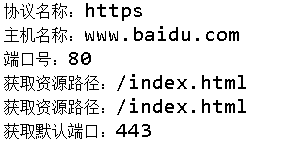InetAddress 类
封装计算机的 IP 地址,不包含端口号
InetAddress 类常用的方法
1 String getHostAddress() 获得 IP 地址
2 String getHostName() 获得主机名
3 static InetAddress getByName(String host) 根据主机名获得 IP 地址
1 import java.net.InetAddress; 2 import java.net.UnknownHostException; 3 4 public class TestInetAddress { 5 6 public static void main(String[] args) throws UnknownHostException { 7 8 InetAddress localHost = InetAddress.getLocalHost(); //本机 9 System.out.println("本机IP地址:" + localHost.getHostAddress()); 10 System.out.println("本机名称:" + localHost.getHostName()); 11 12 //根据域名得到InetAddress对象 13 InetAddress bd = InetAddress.getByName("www.baidu.com"); 14 System.out.println("百度服务器地址:" + bd.getHostAddress()); 15 System.out.println("百度服务器名称:" + bd.getHostName()); 16 17 //根据IP地址得到InetAddress对象 18 InetAddress ia = InetAddress.getByName("39.130.131.42"); 19 System.out.println("服务器主机IP:" + ia.getHostAddress()); 20 //如果39.130.131.42IP地址不存在或者DNS(域名解析系统)不允许进行IP地址和域名的映射,就会直接返回域名地址 21 System.out.println("主机名称" + ia.getHostName()); 22 } 23 24 }
运行结果:

-------------------------------------------------------------------------
InetSocketAddress 类
此类用于实现 IP 套接字地址 (IP 地址+端口号),用于socket 通信
InetSocketAddress 类常用的方法
1 InetAddress getAddress() 获取 InetAddress 对象
2 int getPort() 获取端口号
3 String getHostName() 获取主机名
1 import java.net.InetAddress; 2 import java.net.InetSocketAddress; 3 import java.net.UnknownHostException; 4 5 public class TestInetSocketAddress { 6 7 public static void main(String[] args) throws UnknownHostException { 8 9 //创建对象 10 InetSocketAddress is1 = new InetSocketAddress("localhost", 9999); 11 InetSocketAddress is2 = new InetSocketAddress("127.0.0.1", 9999); 12 InetSocketAddress is3 = new InetSocketAddress("192.168.136.1", 9999); 13 14 InetAddress ia = InetAddress.getByName("192.168.136.1"); 15 InetSocketAddress is4 = new InetSocketAddress(ia, 9999); 16 System.out.println("主机名称:" + is4.getHostName()); 17 System.out.println("主机IP地址:" + is4.getAddress()); 18 } 19 20 }

-----------------------------------------------------------------------------------------------------------------------------
URL类
URL(Uniform Resource Locator)统一资源定位符,由 4 部分组成:协议 、存放资源的主机域名、端口号和资源文件名。
URL 是指向互联网“资源”的指针资源可以是简单的文件或目录,也可以是对更为复杂的对象的引用,例如对数据库或搜索引擎的查询
URL 类常用方法
1 String getProtocal() 获取此 URL 的协议名称
2 String getHost() 获取此 URL 的主机名(如果适用)
3 int getPort() 获取 URL 的端口号
4 String getFile() 获取此 URL 的文件名
5 getDefaultPort() 获取与此 URL 关联协议的默认端口号
6 getPath() 获取此 URL 的路径部分
1 import java.net.MalformedURLException; 2 import java.net.URI; 3 import java.net.URL; 4 5 public class TestUrl { 6 public static void main(String[] args) throws MalformedURLException { 7 8 URL url = new URL("https://www.baidu.com:80/index.html"); 9 System.out.println("协议名称:" + url.getProtocol()); 10 System.out.println("主机名称:" + url.getHost()); 11 System.out.println("端口号:" + url.getPort()); //URL不指明端口号则getPort()返回-1 12 System.out.println("获取资源路径:" + url.getFile()); 13 System.out.println("获取资源路径:" + url.getPath()); 14 System.out.println("获取默认端口:" + url.getDefaultPort()); 15 } 16 17 }

-------------------------------------------------------------------------------------------------------
openStream()方法 打开到此 URL 的连接并返回一个用于从该连接读入的InputStream
1 import java.io.BufferedReader; 2 import java.io.BufferedWriter; 3 import java.io.FileOutputStream; 4 import java.io.IOException; 5 import java.io.InputStream; 6 import java.io.InputStreamReader; 7 import java.io.OutputStreamWriter; 8 import java.net.MalformedURLException; 9 import java.net.URL; 10 11 public class TestUrl2 { 12 public static void main(String[] args) throws IOException { 13 /**网络爬虫 14 * (1)从网络上获取资源 15 * (2)存储到本机 16 */ 17 //(1)创建URL对象 18 URL url = new URL("https://www.baidu.com"); //获取主页资源 19 //(2)获取字节输入流 20 InputStream is = url.openStream(); 21 //(3)缓冲流 22 BufferedReader br = new BufferedReader(new InputStreamReader(is, "utf-8")); 23 //(4)存储到本地 24 BufferedWriter bw = new BufferedWriter(new OutputStreamWriter(new FileOutputStream("F://index.html"), "utf-8")); 25 //(5)边读边写 26 String line = null; 27 while( (line = br.readLine()) != null) { 28 bw.write(line); //写入 29 bw.newLine(); //换行 30 bw.flush(); //清空缓冲区 31 } 32 //(6)关闭流 33 bw.close(); 34 br.close(); 35 } 36 37 }